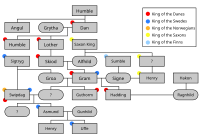
Aarhus is the second-largest city in Denmark and the seat of Aarhus municipality. It is located on the eastern shore of Jutland in the Kattegat sea and approximately 187 kilometres (116 mi) northwest of Copenhagen.
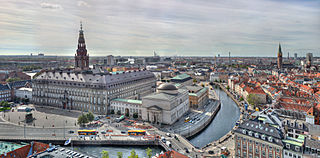
Copenhagen is the capital and most populous city of Denmark. As of 1 January 2021, the city had a population of 799,033. It forms the core of the wider urban area of Copenhagen and the Copenhagen metropolitan area. Copenhagen is situated on the eastern coast of the island of Zealand; another portion of the city is located on Amager, and it is separated from Malmö, Sweden, by the strait of Øresund. The Øresund Bridge connects the two cities by rail and road.

Danish is a North Germanic language spoken by about six million people, principally in Denmark, Greenland, the Faroe Islands and in the region of Southern Schleswig in northern Germany, where it has minority language status. Also, minor Danish-speaking communities are found in Norway, Sweden, Spain, the United States, Canada, Brazil, and Argentina. Due to immigration and language shift in urban areas, about 15–20% of the population of Greenland speak Danish as their first language.

Greenland is the world's largest island, located between the Arctic and Atlantic oceans, east of the Canadian Arctic Archipelago. Greenland is an autonomous territory within the Kingdom of Denmark. Though physiographically a part of the continent of North America, Greenland has been politically and culturally associated with Europe for more than a millennium, beginning in 986. The majority of its residents are Inuit, whose ancestors migrated from Alaska through Northern Canada, gradually settling across the island by the 13th century.
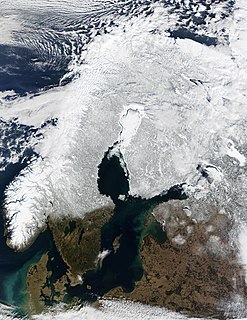
Scandinavia is a subregion in Northern Europe, with strong historical, cultural, and linguistic ties.
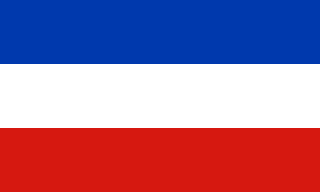
Schleswig-Holstein is the northernmost of the 16 states of Germany, comprising most of the historical duchy of Holstein and the southern part of the former Duchy of Schleswig. Its capital city is Kiel; other notable cities are Lübeck and Flensburg.

The United States Virgin Islands, officially the Virgin Islands of the United States, are a group of Caribbean islands and an unincorporated and organized territory of the United States. The islands are geographically part of the Virgin Islands archipelago and are located in the Leeward Islands of the Lesser Antilles to the east of Puerto Rico and west of the British Virgin Islands.

Zealand or Sealand, at 7,031 km2, is the largest and most populous island in Denmark proper. Zealand has a population of 2,319,705.

Margrethe II is Queen of Denmark and commander-in-chief of the Danish Defence.

Denmark is a Nordic country in Northern Europe. European Denmark, which is the southernmost of the Scandinavian countries, consists of a peninsula, Jutland, and an archipelago of 443 named islands, with the largest being Zealand, Funen and the North Jutlandic Island. The islands are characterised by flat, arable land and sandy coasts, low elevation and a temperate climate. Denmark lies southwest of Sweden and south of Norway, and is bordered to the south by Germany. The Kingdom of Denmark is constitutionally a unitary state comprising metropolitan Denmark and the two autonomous territories in the North Atlantic Ocean: the Faroe Islands and Greenland. Denmark has a total area of 42,943 km2 (16,580 sq mi) as of 2020, and the total area including Greenland and the Faroe Islands is 2,210,579 km2 (853,509 sq mi). Metropolitan Denmark has a population of 5.85 million, of which 800,000 live in the capital and largest city Copenhagen.

At the outset of World War II in September 1939, Denmark declared itself neutral. For most of the war, the country was a protectorate and then an occupied territory of Germany. The decision to occupy Denmark was taken in Berlin on 17 December 1939. On 9 April 1940, Germany occupied Denmark in Operation Weserübung. The Danish government and king functioned as relatively normal in a de facto protectorate over the country until 29 August 1943, when Germany placed Denmark under direct military occupation, which lasted until the Allied victory on 5 May 1945. Contrary to the situation in other countries under German occupation, most Danish institutions continued to function relatively normally until 1945. Both the Danish government and king remained in the country in an uneasy relationship between a democratic and a totalitarian system until the Danish government stepped down in a protest against German demands to institute the death penalty for sabotage.

Frederik, Crown Prince of Denmark, Count of Monpezat, is the heir apparent to the Danish throne. He is the elder son of Queen Margrethe II and Prince Henrik.

Danes are a North Germanic ethnic group native to Denmark and a modern nation identified with the country of Denmark. This connection may be ancestral, legal, historical, or cultural.
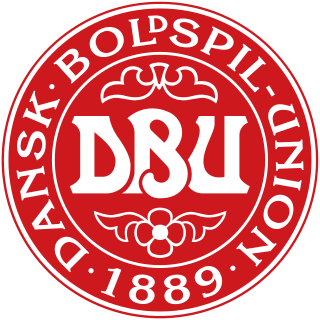
The Denmark national football team represents Denmark in men's international football competition. It is controlled by the Danish Football Association (DBU), the governing body for the football clubs which are organised under DBU. Denmark's home stadium is Parken Stadium in the Østerbro district of Copenhagen; their head coach is Kasper Hjulmand.

The Faroe Islands, or simply the Faroes or Faeroes, are a North Atlantic archipelago located 320 kilometres (200 mi) north-northwest of Scotland, and about halfway between Norway and Iceland. Like Greenland, it is an autonomous territory of the Kingdom of Denmark. The islands have a total area of about 1,400 square kilometres (540 sq mi) with a population of 53,358 as of June 2021.

Denmark–Norway, also known as the Dano-Norwegian Realm or the Twin Realms (Tvillingrigerne), was an early modern multi-national and multi-lingual real union consisting of the Kingdom of Denmark, the Kingdom of Norway, the Duchy of Schleswig, and the Duchy of Holstein. The state also claimed sovereignty over three historical peoples: Frisians, Gutes and Wends. Denmark–Norway had several colonies, namely the Danish Gold Coast, the Nicobar Islands, Serampore, Tharangambadi, and the Danish West Indies. See Colonies
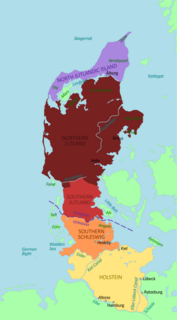
Jutland, known anciently as the Cimbric or Cimbrian Peninsula, is a peninsula of Northern Europe that forms the continental portion of Denmark and part of northern Germany. The names are derived from the Jutes and the Cimbri, respectively.
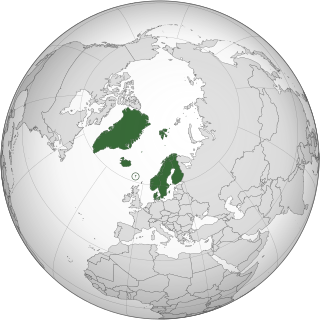
The Nordic countries, or the Nordics, or Norden, are a geographical and cultural region in Northern Europe and the North Atlantic. It includes the sovereign states of Denmark, Finland, Iceland, Norway and Sweden as well as the autonomous territories of the Faroe Islands and Greenland and the autonomous region of the Åland Islands.

Christian Dannemann Eriksen is a Danish professional footballer who plays as an attacking midfielder for Serie A club Inter Milan and the Denmark national team. Eriksen is also capable of playing as a central midfielder or mezzala in a 4–3–3 system.
The COVID-19 pandemic in Denmark is part of the ongoing worldwide pandemic of coronavirus disease 2019 caused by severe acute respiratory syndrome coronavirus 2. The virus was first confirmed to have spread to Denmark on 27 February 2020.
